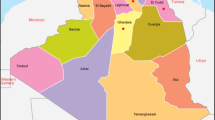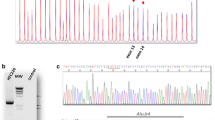Abstract
The reported incidence of hereditary colorectal cancers (CRCs) is widely variable. The principal aim of the study was to prospectively evaluate the incidence of familial CRCs in a region of northern Italy using a standardized method. Consecutive CRC patients were prospectively enrolled from October 2002 to December 2003. Patients underwent a structured family history, the microsatellite instability (MSI) test and a screen for MUTYH mutations. Following family history patients were classified as belonging to high, moderate and mild risk families. Immunohistochemistry for MLH1, MSH2, MSH6 and PMS2 proteins and investigation for MLH1/MSH2 mutations, for MLH1 promoter methylation and for the V600E hotspot BRAF mutation were performed in high MSI (MSI-H) cases. Of the 430 patients enrolled, 17 (4%) were high risk [4 hereditary non-polyposis colorectal cancer (HNPCC), 12 suspected HNPCC and 1 MUTYH-associated adenomatous polyposis coli (MAP)], 53 moderate risk and 360 mild risk cases. The MSI test was performed on 393 tumours, and 46 (12%) of them showed MSI-H. In these patients, one MLH1 pathogenetic mutations and two MSH2 pathogenetic mutations were found. Thirty-two (70%) MSI-H cases demonstrated MLH1 methylation and/or BRAF mutation: None of them showed MLH1/MSH2 mutation. Two biallelic germline MUTYH mutations were found, one with clinical features of MAP. A strong family history of CRC was present in 4% of the enrolled cases; incidence of MLH1/MSH2 or MUTHY mutations was 1.3% and of MSI-H phenotype was 12%. MLH1 methylation and BRAF mutation can exclude 70% of MSI-H cases from gene sequencing.

Similar content being viewed by others
References
Järvinen HJ, Aarnio M, Mustonen H, et al. Controlled 15-year trial on screening for colorectal cancer in families with hereditary nonpolyposis colorectal cancer. Gastroenterology. 2000;118:829–34.
Vasen HFA, Mecklin J-P, Khan PM, Lynch HT. The International Collaborative Group on Hereditary Nonpolyposis Colorectal Cancer (ICG-HNPCC). Dis Colon Rectum. 1991;34:424–5.
Vasen HF, Watson P, Mecklin JP, Lynch HT. New clinical criteria for hereditary nonpolyposis colorectal cancer (HNPCC, Lynch syndrome) proposed by the international collaborative group on HNPCC. Gastroenterology. 1999;116:1453–6.
Peltomäki P. Lynch syndrome genes. Fam Cancer. 2005;4:227–32.
Syngal S, Fox EA, Eng C, et al. Sensitivity and specificity of clinical criteria for hereditary non-polyposis colorectal cancer associated mutations in MSH2 and MLH1. J Med Genet. 2000;37:641–5.
Boland CR, Koi M, Chang DK, Carethers JM. The biochemical basis of microsatellite instability and abnormal immunohistochemistry and clinical behavior in Lynch syndrome: from bench to bedside. Fam Cancer. 2008;7:41–52.
Hampel H, Frankel WL, Martin E, et al. Screening for the Lynch syndrome (hereditary nonpolyposis colorectal cancer). N Engl J Med. 2005;352:1851–60.
Groden J, Thliveris A, Samowitz W, et al. Identification and characterization of the familial adenomatous polyposis coli gene. Cell. 1991;66:580–600.
Knudsen AL, Bisgaard L, Bülow S. Attenuated familial adenomatous polyposis (AFAP). A review of the literature. Familial cancer. 2003;2:43–55.
Sampson JR, Jones N. MUTYH-associated polyposis. Best Pract Res Clin Gastroenterol. 2009;23:209–18.
Al-Tassan N, Chmiel NH, Maynard J, et al. Inherited variants of MUTYH associated with somatic G:C?T:A mutations in colorectal tumors. Nat Genet. 2002;30:227–32.
Halford SE, Rowan AJ, Lipton L, et al. Germline mutations but not somatic changes at the MUTYH locus contribute to the pathogenesis of unselected colorectal cancers. Am J Pathol. 2003;162:1545–8.
Park JG, Vasen HF, Park KJ, et al. Suspected hereditary nonpolyposis colorectal cancer: International Collaborative Group on Hereditary Non-Polyposis Colorectal Cancer (ICG-HNPCC) criteria and results of genetic diagnosis. Dis Colon Rectum. 1999;42:710–5.
Boland CR, Thibodeau SN, Hamilton SR, et al. A national cancer institute workshop on microsatellite instability for cancer detection and familial predisposition: development of international criteria for the determination of microsatellite instability in colorectal cancer. Cancer Res. 1998;58(22):5248–57.
Agostini M, Enzo MV, Morandi L, et al. A ten markers panel provides a more accurate and complete microsatellite instability analysis in mismatch repair-deficient colorectal tumors. Cancer Biomarkers. 2010;6:49–61.
Menigatti M, Di Gregorio C, Borghi F, et al. Methylation pattern of different regions of the MLH1 promoter and silencing of gene expression in hereditary and sporadic colorectal cancer. Genes Chromosomes Cancer. 2001;31:357–61.
Rajagopalan H, Bardelli A, Lengauer C, Kinzler KW, Vogelstein B, Velculescu VE. Tumorigenesis: RAF/RAS oncogenes and mismatch-repair status. Nature. 2002;418:934. 69.
Deng G, Bell I, Crawley S, et al. BRAF mutation is frequently present in sporadic colorectal cancer with methylated hMLH1, but not in hereditary nonpolyposis colorectal cancer. Clin Cancer Res. 2004;10:191–5.
Herman JG, Graff JR, Myohanen S, Nelkin BD, Baylin SB. Methylation-specific PCR: a novel PCR assay for methylation status of CpG islands. Proc Natl Acad Sci. 1996;93:9821–6.
Lindor NM, Burgart LJ, Leontovich O, Goldberg RM, et al. Immunohistochemistry versus microsatellite instability testing in phenotyping colorectal tumors. J Clin Oncol. 2002;20(4):1043–8.
Agostini M, Tibiletti Mg, Lucci-Cordisco E, et al. Two PMS2 mutations in a Turcot syndrome family with small bowel cancers. Am J Gastroenterol. 2005;100(8):1886–91.
Nascimbeni R, Pucciarelli S, Di Lorenzo D, et al. Rectum-sparing surgery may be appropriate for biallelic MutYH-associated polyposis. Disease and Colon Rectum. 2010;53(12):1670–5.
Schouten JP, McElgunn CJ, Waaijer R, et al. Relative quantification of 40 nucleic acid sequences by multiplex ligation-dependent probe amplification. Nucleic Acids Res. 2002;30:e57.
Pastrello C, Pin E, Marroni F, Bedin C, et al. Integrated analysis of unclassified variants in mismatch repair genes. Genet Med. 2011;13(2):115–24.
Davies H, Bignell GR, Cox C, et al. Mutations of the BRAF gene in human cancer. Nature. 2002;417:949–54.
Gismondi V, Meta M, Bonelli L, et al. Prevalence of the Y165C, G382D and 1395delGGA germline mutations of the MUTYH gene in Italian patients with adenomatous polyposis coli and colorectal adenomas. Int J Cancer. 2004;109:680–4.
Avezzù A, Agostini M, Pucciarelli S, et al. The role of MUTYH gene in genetic predisposition to colorectal cancer: another piece of the puzzle. Cancer Letter. 2008;268:308–13.
Evans DGR, Walsh JJ, Robinson C, et al. Incidence of hereditary non polyposis colorectal cancer in a population-based study of 1137 consecutive cases of colorectal cancer. Br J Surg. 1997;84:1281–5.
Katballe N, Christensen M, Wikman FP, et al. Frequency of hereditary non polyposis colorectal cancer in Danish colorectal cancer patients. Gut. 2002;50:43–51.
Peel DJ, Ziogas A, Fox EA, et al. Characterization of hereditary non polyposis colorectal cancer families from a population based series of cases. J Natl Cancer Inst. 2000;92:1517–22.
Ruo L, Cellini C, La-Calle Jr JP, Murray M, Thaler HT, Quan SH, et al. Limitations of family cancer history assessment at initial surgical consultation. Dis Colon Rectum. 2001;44:98–103.
Percesepe A, Borghi F, Menigatti M, et al. Molecular screening for hereditary nonpolyposis colorectal cancer: a prospective, population based study. J Clin Oncol. 2001;19:3944–50.
Aaltonen LA, Salovaara R, Kristo P, et al. Incidence of hereditary colorectal cancer and the feasibility of molecular screening for the disease. NEJM. 1998;338:1481–7.
Salovaara R, Loukola A, Kristo P, et al. Population based molecular detection of hereditary non polyposys colorectal cancer. J Clin Oncol. 2000;18:2193–200.
Piñol V, Castells A, Andreu M, et al, for the Gastrointestinal Oncology Group of the Spanish Gastroenterological Association. Accuracy of revised Bethesda guidelines, microsatellite instability, and immunohistochemistry for the identification of patients with hereditary nonpolyposis colorectal cancer. JAMA 2005;293:1986–94.
Lagerstedt Robinson K, Liu T, Vandrovcova J, et al. Lynch syndrome (hereditary nonpolyposis colorectal cancer) diagnostics. J Natl Cancer Inst. 2007;99:291–9.
Balaguer F, Castellví-Bel S, Castells A, et al. Gastrointestinal oncology group of the Spanish gastroenterological association. Identification of MUTYH mutation carriers in colorectal cancer: a multicenter, case–control, population-based study. Clin Gastroenterol Hepatol. 2007;5:379–87.
Croitoru ME, Cleary SP, Di Nicola N, et al. Association between biallelic and monoallelic germline MUTYH gene mutations and colorectal cancer risk. J Natl Cancer Inst. 2004;96(21):1631–4.
Kim IJ, Ku JL, Kang HC, et al. Mutational analysis of OGG1, MUTYH, MTH1 in FAP, HNPCC and sporadic colorectal cancer patients: R154H OGG1 polymorphism is associated with sporadic colorectal cancer patients. Hum Genet. 2004;115:498–503.
Görgens H, Krüger S, Kuhlisch E, Pagenstecher C, Höhl R, Schackert HK, et al. Microsatellite stable colorectal cancers in clinically suspected hereditary nonpolyposis colorectal cancer patients without vertical transmission of disease are unlikely to be caused by biallelic germline mutations in MUTYH. J Mol Diagn. 2006;8:178–82.
Lindor NM, Rabe K, Petersen GM, et al. Lower cancer incidence in Amsterdam-I criteria families without mismatch repair deficiency: familial colorectal cancer type X. JAMA. 2005;293:1979–85.
Salovaara R, Loukola A, Kristo P, et al. Population based molecular detection of hereditary nonpolyposis colorectal cancer. J Clin Oncol. 2002;18:2193–200.
Ribic CM, Sargent DJ, Moore MJ, et al. Tumor microsatellite-instability status as a predictor of benefit from fluorouracil-based adjuvant chemotherapy for colon cancer. N Engl J Med. 2003;349:247–57.
Carethers JM. Prospective evaluation of fluorouracil chemotherapy based on the genetic makeup of colorectal cancer. Gut. 2006;55:1819.
Imai K, Yamamoto H. Carcinogenesis and microsatellite instability: the interrelationship between genetics and epigenetics. Carcinogenesis. 2008;29:673–80.
Domingo E, Laiho P, Ollikainen M, et al. BRAF screening as a low-cost effective strategy for simplifying HNPCC genetic testing. J Med Genet. 2004;41:663–7.
Acknowledgments
We are grateful to Associazione Italiana Ricerca sul Cancro (AIRC) e Banca Antonveneta Foundation for their financial support. Biological samples were provided by 2nd Surgical Clinic, Tumor Tissue Biobank.
Conflicts of interest
None
Author information
Authors and Affiliations
Corresponding author
Additional information
Synopsis
For evaluate prospectively the incidence of hereditary colorectal cancers (CRC) in a region of Italy, 430 patients were enrolled. A strong family history of CRC was present in 4% of cases; incidence of MLH1/MSH2 or MUTHY mutations was 1.3%.
Rights and permissions
About this article
Cite this article
Urso, E., Agostini, M., Pucciarelli, S. et al. Clinical and molecular detection of inherited colorectal cancers in northeast Italy. Tumor Biol. 33, 857–864 (2012). https://doi.org/10.1007/s13277-011-0312-0
Received:
Accepted:
Published:
Issue Date:
DOI: https://doi.org/10.1007/s13277-011-0312-0




